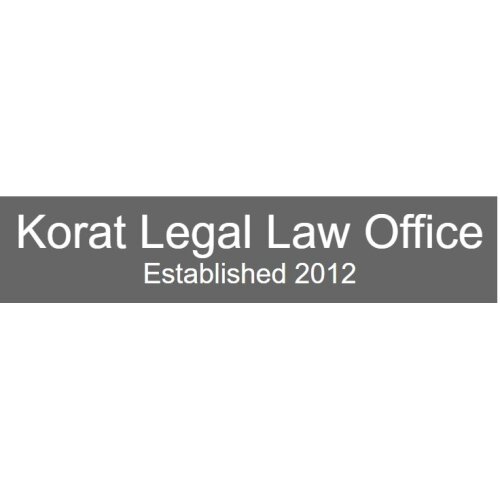Best Child Abuse Lawyers in Nakhon Ratchasima
Share your needs with us, get contacted by law firms.
Free. Takes 2 min.
Free Guide to Hiring a Family Lawyer
List of the best lawyers in Nakhon Ratchasima, Thailand
About Child Abuse Law in Nakhon Ratchasima, Thailand
Child abuse is a significant concern in Nakhon Ratchasima, Thailand, as it is worldwide. The law in Thailand strictly prohibits all forms of child abuse, including physical, emotional, and sexual abuse, as well as neglect. The Thai government has implemented numerous measures to protect children and provide support for victims of abuse. In Nakhon Ratchasima, responsible authorities work to offer assistance and justice for affected children and their families. Various local and national organizations collaborate to ensure the safety and well-being of children.
Why You May Need a Lawyer
Engaging a lawyer might be essential in several situations related to child abuse. If you are accused of child abuse, a lawyer can provide you with legal defense and ensure your rights are protected. Similarly, if you are a victim or a family member of a victim, legal help is crucial to navigate the reporting process, seek justice, and receive compensation. Additionally, legal assistance is often needed in custody disputes where abuse allegations are involved or when interacting with governmental agencies or services aimed at child protection.
Local Laws Overview
Thailand’s Child Protection Act and the Penal Code are pivotal in addressing child abuse. Key components include mandated reporting of suspected abuse, severe penalties for offenders, and protective measures for victims. Additionally, the law mandates the establishment of Child Protection Committees at various levels to coordinate the protection and welfare of children. In Nakhon Ratchasima, local committees work closely with law enforcement and social services to address and prevent child abuse cases.
Frequently Asked Questions
What constitutes child abuse under Thai law?
Child abuse under Thai law includes physical harm, emotional abuse, sexual exploitation, and neglect. It covers acts that cause bodily injury or mental suffering to a child.
How do I report suspected child abuse?
Suspected child abuse can be reported to local law enforcement or the Department of Social Development and Welfare. There are also hotlines available for immediate assistance.
What agencies handle child abuse cases in Nakhon Ratchasima?
The primary agencies include local police, hospitals, and the provincial offices of the Ministry of Social Development and Human Security.
Can child abuse cases be settled out of court?
While some cases might be settled through mediation, particularly in civil matters, criminal cases of child abuse often require judicial proceedings due to their serious nature.
What are the penalties for child abuse in Thailand?
Penalties range from fines to imprisonment, depending on the severity of the abuse. Severe abuse, especially leading to injury or death, results in significant prison terms.
Is there any support available for child abuse victims?
Yes, victims can access counseling, medical care, and legal assistance through governmental and non-governmental organizations dedicated to child welfare.
How long does it take to resolve child abuse cases in court?
The duration varies depending on the complexity of the case but typically ranges from several months to a few years.
What role do social workers play in child abuse cases?
Social workers assess the child's situation, provide necessary support, and work with law enforcement and the judiciary to ensure the child's welfare is prioritized.
Can I lose custody of my child if accused of abuse?
Yes, allegations of child abuse can result in custody changes, especially if the accusations are substantiated and pose a risk to the child.
Are there confidentiality protections for the parties involved?
Yes, Thai law includes provisions to protect the identity and privacy of the child and family involved in abuse cases.
Additional Resources
For those seeking more information or assistance, the following resources can be helpful:
- The One-Stop Crisis Center (OSCC) for immediate crisis support
- Ministry of Social Development and Human Security for comprehensive social services
- International organizations like UNICEF supporting child welfare initiatives
Next Steps
If you need legal assistance regarding a child abuse case, the first step is to contact a qualified lawyer with experience in family and criminal law in Thailand. You can reach out to local bar associations or legal aid services for referrals. It’s also crucial to gather any relevant documentation and evidence regarding the case. If immediate protection for a child is needed, don’t hesitate to reach out to local authorities or helplines to ensure the child's safety while legal processes are underway.
Lawzana helps you find the best lawyers and law firms in Nakhon Ratchasima through a curated and pre-screened list of qualified legal professionals. Our platform offers rankings and detailed profiles of attorneys and law firms, allowing you to compare based on practice areas, including Child Abuse, experience, and client feedback.
Each profile includes a description of the firm's areas of practice, client reviews, team members and partners, year of establishment, spoken languages, office locations, contact information, social media presence, and any published articles or resources. Most firms on our platform speak English and are experienced in both local and international legal matters.
Get a quote from top-rated law firms in Nakhon Ratchasima, Thailand — quickly, securely, and without unnecessary hassle.
Disclaimer:
The information provided on this page is for general informational purposes only and does not constitute legal advice. While we strive to ensure the accuracy and relevance of the content, legal information may change over time, and interpretations of the law can vary. You should always consult with a qualified legal professional for advice specific to your situation.
We disclaim all liability for actions taken or not taken based on the content of this page. If you believe any information is incorrect or outdated, please contact us, and we will review and update it where appropriate.









